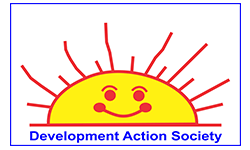Cause Area
Primary Sectors
Secondary Sectors
Financials
-
2020
Total IncomeRs.11,408,942Total ExpensesRs.11,371,025Non Program ExpensesRs.2,087,989Program ExpensesRs.9,283,036Tip: Click on any value above to exclude it. -
2021
Total IncomeRs.8,079,819Total ExpensesRs.8,120,840Non Program ExpensesRs.1,604,267Program ExpensesRs.6,516,573Tip: Click on any value above to exclude it. -
2022
Total IncomeRs.10,355,342Total ExpensesRs.10,070,426Non Program ExpensesRs.1,864,797Program ExpensesRs.8,205,629Tip: Click on any value above to exclude it.
Geographies Served
Programs
-
Education Programmes
StateStates
West Bengal
DAS prioritizes education to uplift marginalized communities, reaching over 14,000 children. It supports enrolment and retention, operating educational centres and alternative programmes for kids aged 3 to 18. Amidst COVID-19, ensuring uninterrupted learning is a challenge, prompting an appeal for donations to sustain education. Notably, DAS combats child labour, enrolling 6000+ kids through government-backed initiatives, conducting awareness programmes, and monitoring labour practices. It also runs safe residential schools for 200+ girls, preventing early marriage, trafficking, and abuse. Additionally, DAS provides early intervention for children aged 0-6, benefiting 10,000+ kids by offering health, nutrition education, and prenatal/postnatal care to mothers, preventing malnourishment and health issues.
-
Child Protection Programme
District
Kolkata
South 24 Parganas
North 24 Parganas
Nadia
Bardhaman
States
West Bengal
DAS prioritizes safeguarding vulnerable children, including those from marginalized backgrounds like migrant workers' families. It tackles threats such as child labour, abuse, trafficking, and discrimination. Through community engagement and government partnerships, DAS has integrated over 6,000 children into schools while offering diverse personality development programmes. Notably, initiatives like the Rugby Girls Team's participation in national matches and forums like the Children’s Parliament empower children. With 70 trained children as educators on critical issues, DAS faces intensified child protection challenges due to COVID-19, seeking support to protect over 14,000 children across its operational areas.
-
Public Health Programmes
StateStates
West Bengal
DAS focuses on public health, addressing major concerns like communicable and non-communicable diseases in Indian suburbs. Through awareness programmes, training, and advocacy across all locations, DAS reaches over 100,000 people with curative care and health education. It collaborates with local authorities, ensuring access to primary health care, particularly for marginalized communities. Programmes encompass anaemia eradication among adolescents and women, nutritional support, health check-ups, hygiene awareness, and disease management. DAS's community-driven approach fosters healthcare accessibility for all backgrounds, leading to strengthened Government health centres, even in remote regions. Supported by donors like GOAL India, CINI, USAID, and more, their public health initiatives expand yearly. However, amid the pandemic, DAS acknowledges the ongoing need for extensive efforts to enhance health and empower communities for a better future.
-
Water, Sanitation & Hygiene Programme
StateStates
West Bengal
DAS initiated the Water, Sanitation, and Hygiene (WASH) program in 2010, focusing on urban slums, promoting safe water handling, hygiene practices, and creating disease-free environments. It expanded these efforts to rural areas in 2012, emphasizing ongoing WASH practices. Establishing Water and Sanitation Committees at the community level, DAS monitors resources, educates on behavioural changes, and collaborates with authorities and the private sector. Its initiatives include multiple awareness programmes, renovating school toilets, constructing over 370 toilets, and creating water source points and soak pits for drainage. Engaging with Government schemes like Swaccha Bharat Mission, Nirmal Bharat Abhiyan, and seeking support from partners like Save the Children, Reckitt Benckiser, and USAID, DAS remains committed to enhancing WASH practices and infrastructure for communities.
-
Livelihoods Programme
StateStates
West Bengal
DAS aims to transform communities where illiteracy and unskilled labour prevail, primarily in Kolkata's urban slums. Most adults engage in menial jobs, struggling to meet their families' basic needs. Since 1995, DAS has championed education, vocational training, and empowerment, eradicating child labour and enabling women to earn dignified livelihoods. It offers diverse training programmes from jute product making to nursing, aiming to introduce varied self-employment avenues. Providing funding assistance, training in essential business skills, and conducting yearly workshops for extremely vulnerable youth, DAS emphasizes skill-building tailored to market demands. It has notably focused on empowering the poorest women in Kolkata's dump areas, offering training in various trades, while recent efforts target marginalized youth for skill-based training aligned with market needs, including facility management, beautician courses, and electrical works.
Registration Details
-
PAN Card
AAATD4969R
-
Registration Number
SO062734 of 1989-1990
-
CSR Form 1
Not Available
-
FCRA
147120517
About
-
Headquarters
Kolkata, West Bengal
-
Since
1989
Impact
Development Action Society has reached over 28,500 households, supported more than 98,000 children, engaged with 59,700 women, spanned across five districts, and provided assistance to over 10,900 children under the age of six, showcasing a wide-reaching impact across various communities.
Vision and Mission
DAS's mission is to empower women, children, and youth to realize their rights and access resources by enjoying the benefits of education, good health, and livelihood, enabling them to transform their communities. Their vision is a world where every human being enjoys equal rights and opportunities to lead a healthy and creative life with dignity and self-respect.
Political & Religious Declarations
-
Political Affiliation
-
Religious Affiliation
Location
-
Offices in Cities
Other Details
-
Type
Non-profit
-
Sub Type
Society
Website
Technology Adoption
-
SOC 2 Compliant
No
-
Financial Management
-
Beneficiary Management



